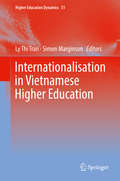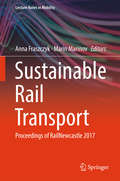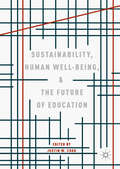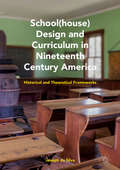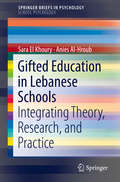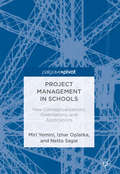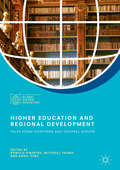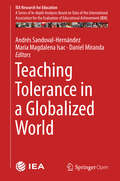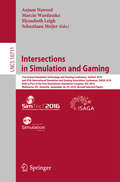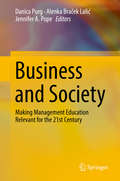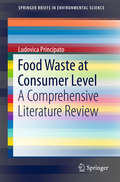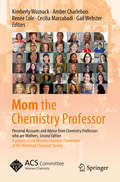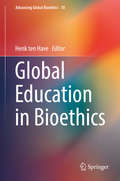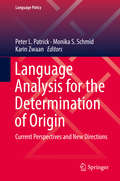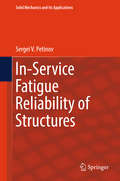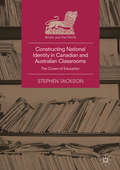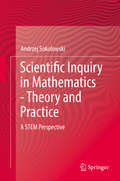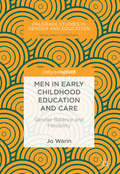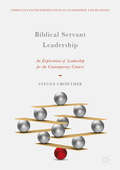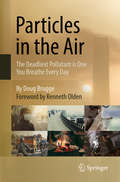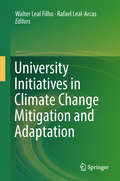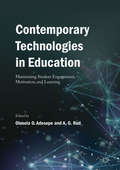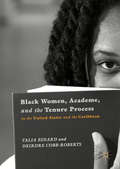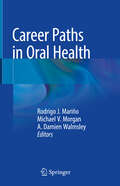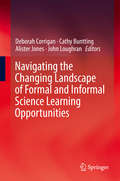- Table View
- List View
Internationalisation in Vietnamese Higher Education (Higher Education Dynamics #51)
by Simon Marginson Ly Thi TranThis book focuses on models, strengths, opportunities, constraints and tensions in internationalisation in Vietnamese higher education. It reflects on key concepts from contemporary theories and models of internationalisation and discusses the implications for innovation, flexibility and responsiveness to local needs in Vietnam. Based on empirical research, theoretical knowledge and the experiences of researchers from Vietnam and overseas, the book draws out the distinctiveness and complexity of internationalisation practices and charts a way forward. It examines the key drivers and dimensions of internationalising Vietnamese higher education, and compares internationalisation in Vietnam to that in other countries. It clarifies and discusses tensions related to the appropriation of ‘Western’ internationalisation practice and models, and neo-liberal ideologies, to the local context of Vietnam. It provides readers with insights into government policy, quality assurance and benchmarking strategies, curriculum, the impact of international organisations on higher education, international student mobility, transnational education, employability, brain drain and brain gain and brain circulation.
Sustainable Rail Transport: Proceedings of RailNewcastle 2017 (Lecture Notes in Mobility)
by Marin Marinov Anna FraszczykThese conference proceedings include a collection of articles presented at the RailExchange conference in October 2017 at Newcastle University, UK. They will be useful for researchers in developing countries looking for opportunities of knowledge exchange. The RailExchange project aimed to develop sustainable railway education in Thailand, via international partnerships and industry collaborations based around stakeholders' expertise and experiences. It involved staff exchange (academics and researchers) between Mahidol and Newcastle University for joint research and curriculum development and also organizing railway conferences and workshops in both Thailand and the UK.The papers published here focus on rail-related issues and present a perspective of a widely understood 'exchange' in academia and industry environments. 'Exchange' is perceived as rail knowledge exchange between partners, rail staff exchange between academia and/or industry, research exchange between teams, student-lecturer knowledge exchange, academia-industry collaboration, etc. In addition, more general rail-related papers are also included.
Sustainability, Human Well-Being, and the Future of Education
by Justin W. CookThis open access book explores the key dimensions of a future education system designed to enable individuals, schools, and communities to achieve the twin twenty-first century challenges of sustainability and human well-being. For much of the twentieth century, Western education systems prepared students to enter the workforce, contribute to society and succeed in relatively predictable contexts. Today, people are at the controls of the planet—making decisions that are dramatically reshaping social, economic, and environmental systems at a global scale. What is education’s purpose in this new reality? What and how must we learn now? The volatility and uncertainty caused by digitalization, globalization, and climate change weave a common backdrop through each chapter. Using case studies drawn from Finland and the US, chapter authors explore various aspects of learning and education system design through the lenses of sustainability and human well-being to evaluate how our understanding and practice of education must transform. Using their scholarly research and experience as practitioners, the authors propose new approaches to preparing learners for a new frontier of the human experience fraught with risks but full of opportunity.
School(house) Design and Curriculum in Nineteenth Century America: Historical and Theoretical Frameworks
by Joseph Da SilvaThis book examines the formative relationship between nineteenth century American school architecture and curriculum. While other studies have queried the intersections of school architecture and curriculum, they approach them without consideration for the ways in which their relationships are culturally formative—or how they reproduce or resist extant inequities in the United States. Da Silva addresses this gap in the school design archive with a cross-disciplinary approach, taking to task the cultural consequences of the relationship between these two primary elements of teaching and learning in a ‘hotspot’ of American education—the nineteenth century. Providing a historical and theoretical framework for practitioners and scholars in evaluating the politics of modern American school design, the book holds a mirror to the oft-criticized state of American education today.
Gifted Education in Lebanese Schools: Integrating Theory, Research, And Practice (SpringerBriefs in Psychology)
by Anies Al-Hroub Sara El KhouryThis Brief discusses research about gifted education in Lebanese schools. It provides an overview of the latest theories, definitions, and practices used to identify gifted students in Lebanese schools. Chapters begin by providing background information on the status of gifted education in Lebanon and the challenges gifted Lebanese children face. Subsequent chapters discuss recent and relevant international definitions of giftedness as well as common misconceptions and underrepresentation of giftedness. The Brief presents research study findings on the cultural definition of giftedness in the minds of Lebanese teachers. It also presents findings on current practices used to identify gifted learners in Lebanese schools. It concludes with recommendations from the teachers that participated in the reported study as well as the authors’ proposal for a Lebanese elementary school policy for identification of gifted students. Gifted Education in Lebanese Schools is an informative resource for researchers, professionals, practitioners, and graduate students in the field of school psychology, educational psychology, gifted and special education, and social work.
Project Management in Schools: New Conceptualizations, Orientations, And Applications
by Miri Yemini Izhar Oplatka Netta SagieThis book provides a comprehensive overview of various models and practices of implementing project management in schools, and conceptualizes the processes of adaptation and development of project management curricula within the unique context of the contemporary school environment. By presenting the general theories and research on project management and adapting these theories to educational organizations and to this specific audience, the authors open a new and promising niche for teaching, research, and practice.
Higher Education and Regional Development: Tales from Northern and Central Europe (Palgrave Studies in Global Higher Education)
by Rómulo Pinheiro Mitchell Young Karel ŠimaThis book analyses the role of universities as critical actors in the socio-economic development of peripheral regions in Norway and the Czech Republic. Examining the ambiguities of the traditional mission of a university in comparison to contemporary demands, the editors and contributors move past single-case analyses to adopt an integrated conceptual and analytical framework. The authors question whether universities can indeed ‘fix’ the conditions of any region they operate in, as is a common assumption, by examining peripheral regions, many of which have been devastated by natural or man-made disasters. Simultaneously acknowledging the complexities at the heart of both higher education institutions and regions, this book brings together a set of critical contributions that shed light on how universities can fulfil their role in peripheral regions rather than knowledge-intensive cities and towns. This uniquely researched book will be of interest to students and scholars of higher education, universities and communities, and education policy.
Teaching Tolerance in a Globalized World (IEA Research for Education #4)
by Andrés Sandoval-Hernández Maria Magdalena Isac Daniel MirandaThis open access thematic report identifies factors and conditions that can help schools and education systems promote tolerance in a globalized world. The IEA’s International Civic and Citizenship Study (ICCS) is a comparative research program designed to investigate the ways in which young people are prepared to undertake their roles as citizens, and provides a wealth of data permitting not only comparison between countries but also comparisons between schools within countries, and students within countries. Advanced analytical methods provide insights into relationships between students’ attitudes towards cultural diversity and the characteristics of the students themselves, their families, their teachers and school principals. The rich diversity of educational and cultural contexts in the 38 countries who participated in ICCS 2009 are also acknowledged and addressed. Readers interested in civic education and adolescents’ attitudes towards cultural diversity will find the theoretical perspectives explored engaging. For readers interested in methodology, the advanced analytical methods employed present textbook examples of how to address cross-cultural comparability of measurement instruments and multilevel data structures in international large-scale assessments (ILSA). Meanwhile, those interested in educational policy should find the identification and comparison of malleable factors across education systems that contribute to positive student attitudes towards cultural diversity a useful and thought-provoking resource.
Intersections in Simulation and Gaming: 21st Annual Simulation Technology And Training Conference, Simtect 2016, And 47th International Simulation And Gaming Association Conference, Isaga 2016, Held As Part Of The First Australasian Simulation Congress, Asc 2016, Melbourne, Vic, Australia, September 26-29, 2016, Revised Selected Papers (Lecture Notes in Computer Science #10711)
by Anjum Naweed Marcin Wardaszko Elyssebeth Leigh Sebastiaan MeijerThis book constitutes the refereed post-conference proceedings of the 21st Annual Simulation Technology and Training Conference, SimTecT 2016, and the 47th International Simulation and Gaming Association Conference, ISAGA 2016, Held as Part of the First Australasian Simulation Congress, ASC 2016, held in Melbourne, VIC, Australia, in September 2016. The 28 revised full papers included in the volume were carefully reviewed and selected from 55 submissions. They are organized in the following topical sections: Making the grade; Come to think of it; From here to fidelity; The name of the game; and Ahead of the game.
Business and Society: Making Management Education Relevant for the 21st Century
by Danica Purg Alenka Braček Lalić Jennifer A. PopeThe world of business is constantly evolving and management education institutions will likely face a number of challenges in keeping up with these changes. While most books focus on the needs of management education institutions, this work addresses the needs of the corporate world in the era of the Fourth Industrial Revolution. Featuring an extensive research study spanning 11 countries, it offers a unique perspective on the business challenges and developmental needs of companies in emerging and recently emerged economies, and on the missing links between those needs and management education. Using both company-specific and country-level data, the book provides businesses and educators with rare insights and recommendations on strengthening existing partnerships (or establishing them anew) between management education institutions and the corporate sector in order to make management education relevant for the 21st century. The book argues that ‘relevance’ should take the center-stage of all higher education institutions in order to accomplish their third mission, namely service to society. This is especially important for management education institutions, whose mission is to mold future managers and leaders who can have a significant influence on economic success and the wellbeing of society.
Food Waste at Consumer Level: A Comprehensive Literature Review (SpringerBriefs in Environmental Science)
by Ludovica PrincipatoThis book presents what is the state-of-the-art in the field of the food waste phenomenon at consumer level, including a thorough literature review, and it highlights trends in the field. It provides a comprehensive starting point for future research. Food waste represents a major public policy issue, which is included in the UN Sustainable Development Goals. In this context, the present work identifies the most important definitions given to food waste and its environmental, social and economic impacts. With a comprehensive literature review that covers a forty-year time span (1977-2017), this book highlights the multiple, complex facets of food waste at the consumer level. Drawing from behavioural and marketing theories, it proposes a new theoretical framework with the aim to better explain food waste behaviour. Extensive research is being carried out on the main worldwide initiatives (both public and private) and food policies aimed at tackling the phenomenon.
Mom the Chemistry Professor: Personal Accounts and Advice from Chemistry Professors who are Mothers
by Renée Cole Cecilia Marzabadi Gail Webster Kimberly Woznack Amber CharleboisWhen is the "right" time? How can I meet the demands of a professorship whilst caring for a young family? Choosing to become a mother has a profound effect on the career path of women holding academic positions, especially in the physical sciences. Yet many women successfully manage to do both. In this second edition, which is a project of the Women Chemists Committee (WCC) of the American Chemical Society (ACS), 40 inspirational personal accounts describe the challenges and rewards of combining motherhood with an academic career in chemistry. The authors are all women at different stages of their career and from a range of institution types, in both tenure and non-tenure track positions. The authors include women from different racial and ethnic backgrounds, who became mothers at different stages of their career, and who have a variety of family structures. Aimed at undergraduate and graduate students of chemistry, as well as postdoctoral fellows and early career faculty, these contributions serve as examples for women considering a career in academia but worry about how this can be balanced with other important aspects of life. The authors describe how they overcame particular challenges, but also highlight aspects of the system, which could be improved to accommodate women academics, and particularly encourage more women to take on academic positions in the sciences.
Global Education in Bioethics: Challenges In Global Bioethics (Advancing Global Bioethics #10)
by Henk Ten HaveThis book presents and elaborates on how the teaching of global ethics in healthcare contributes to furthering ideals of cosmopolitanism: solidarity, equality, respect for differences and concern with what human beings, and specifically patients have in common, regardless of where they live and who they are. Global problems such as pandemic diseases, disasters, lack of care and medication, homelessness and displacement call for global responses. The new area of global bioethics is providing answers by arguing that ethical discourse should first of all criticize the structures of violence and injustice that underlie many threats to global health. Education of health professionals should articulate that they are ‘citizens of the world’, like their patients. This book first demonstrates that a moral vision of global education is necessary to gain a global dimension. It is argued that a global framework of ethical principles is available; the challenge is to elaborate and specify that framework into specific educational approaches and models. The book subsequently analyzes goals and challenges of global education in biomedicine and healthcare. It is shown how such challenges (e.g. inequities and cultural differences) can be overcome. Finally, the book presents concrete examples (cases, methods, and practices) of global education in bioethics. The unique feature of the book is that it addresses global education challenges specifically in the area of healthcare, medicine, and medical science. It combines two areas of research and experience that are usually not connected: global bioethics and global education. This book is written for all those involved in global ethics teaching in medicine, nursing, ethics, philosophy, law, and theology courses.
Language Analysis for the Determination of Origin: Current Perspectives And New Directions (Language Policy #16)
by Monika S. Schmid Peter L. Patrick Karin ZwaanThis comprehensive, up-to-date volume reports on current practices and use of Language Analysis for the Determination of Origin (LADO). Readers will find chapters on how it is done, where it is used, how it is used, and learn about recent developments on the use of LADO reports in judicial practice, and current controversies in the field. LADO is a highly controversial topic, and a relatively new branch of forensic linguistics that is used by most European and some non-European governments. When asylum seekers cannot submit documentary proof of their origin, their language can be analysed in order to assess whether their linguistic profile is in accordance with their stated origin. Around 10,000 such language analyses take place annually. This volume is based on the series of meetings of the Language and Asylum Research Group held between 2010 and 2012 and convened by the editors, and offers a state-of-the art perspective from researchers, practitioners, policymakers and stakeholders working on or with LADO.
In-Service Fatigue Reliability of Structures (Solid Mechanics and Its Applications #251)
by Sergei V. PetinovThis book provides readers with the latest know-how and tools needed to assess the in-service strength and reliability of welded structures. It addresses the two principal mechanisms of structural material deterioration, fatigue and corrosion, which affect the in-service behavior of structures. In this regard, the primary focus is on fatigue in connection with various structural failure scenarios. Realistic and typical examples of welded structures’ design and residual life assessment are used throughout the book in order to show readers the complexity of real-world assessments. The book offers a valuable resource for master’s students in mechanical and civil engineering, and for engineers whose work involves fatigue design and in-service inspections of welded structures.
Constructing National Identity in Canadian and Australian Classrooms: The Crown of Education (Britain and the World)
by Stephen JacksonThis book explores the evolution of Canadian and Australian national identities in the era of decolonization by evaluating educational policies in Ontario, Canada, and Victoria, Australia. Drawing on sources such as textbooks and curricula, the book argues that Britishness, a sense of imperial citizenship connecting white Anglo-Saxons across the British Empire, continued to be a crucial marker of national identity in both Australia and Canada until the late 1960s and early 1970s, when educators in Ontario and Victoria abandoned Britishness in favor of multiculturalism. Chapters explore how textbooks portrayed imperialism, the close relationship between religious education and Britishness, and efforts to end assimilationist Anglocentrism and promote equality in education. The book contributes to British World scholarship by demonstrating how decolonization precipitated a massive search for identity in Ontario and Victoria that continues to challenge educators and policy-makers today.
Scientific Inquiry in Mathematics - Theory and Practice: A Stem Perspective
by Andrzej SokolowskiThis valuable resource provides an overview of recent research and strategies in developing and applying modelling to promote practice-based research in STEM education. In doing so, it bridges barriers across academic disciplines by suggesting activities that promote integration of qualitative science concepts with the tools of mathematics and engineering. The volume’s three parts offer a comprehensive review, by 1) Presenting a conceptual background of how scientific inquiry can be induced in mathematics classes considering recommendations of prior research, 2) Collecting case studies that were designed using scientific inquiry process designed for math classes, and 3) Exploring future possibilities and directions for the research included within. Among the topics discussed: · STEM education: A platform for multidisciplinary learning. · Teaching and learning representations in STEM. · Formulating conceptual framework for multidisciplinary STEM modeling. · Exploring function continuity in context. · Exploring function transformations using a dynamic system. Scientific Inquiry in Mathematics - Theory and Practice delivers hands-on and concrete strategies for effective STEM teaching in practice to educators within the fields of mathematics, science, and technology. It will be of interest to practicing and future mathematics teachers at all levels, as well as teacher educators, mathematics education researchers, and undergraduate and graduate mathematics students interested in research based methods for integrating inquiry-based learning into STEM classrooms.
Men in Early Childhood Education and Care: International Perspectives On Gender And Care (Palgrave Studies in Gender and Education)
by Jo WarinThis book examines the current interest in recruiting and supporting more men in the early childhood education workforce. Drawing on extensive empirical data from case studies of an unusual English preschool setting and interviews with Swedish male preschool staff, the author explores the potential benefits to society linked to the increased presence of men in early childhood education, and how this might be achieved. Throughout the book, the author maintains that the potential of including more men in early childhood education can only be achieved by gender-sensitive practitioners, both women and men, who are willing to create a gender-flexible pedagogy. This volume will be of interest and value to students, academics and practitioners interested in gender diversity and equity within early childhood education and care.
Biblical Servant Leadership: An Exploration of Leadership for the Contemporary Context (Christian Faith Perspectives in Leadership and Business)
by Steven CrowtherThis book explores the concepts from Scripture for Servant leadership and compare these findings with contemporary models of servant leadership. It is an examination of Christian leadership for the contemporary world in its global and increasing secular context. Leadership studies typically view leadership externally from the results. This is a good beginning but leadership needs to also view the inside of leadership in the person of the leader. Scripture is uniquely qualified in this area since its first concern is the person who leads not just in leadership behaviors. The author uses examples from both the Old and New Testament to establish a new shepherd model of leadership that moves beyond the servant mode to the mode of caring direction. This model will provide scholars and researchers as well as leaders themselves with a way of leading that overcomes negative forms of leadership which lead to failure.
Particles in the Air: The Deadliest Pollutant is One You Breathe Every Day
by Doug BruggeThe book covers the three largest sources of particulate matter pollution in five chapters. These sources constitute three of the top ten public health problems in the world today and far outstrip any other environmental health threats in terms of health impact. The book begins with indoor solid fuel combustion for cooking in lower income countries and tells the story of how this problem was identified and recent efforts to eliminate it. The book next looks at tobacco smoking and second hand smoke, again reviewing the history of how these problems were identified scientifically and the fierce industry push back against the science. The last two chapters cover ambient particulate matter in the outdoor air. They address fine and ultrafine particles, describing the pioneering work on fine PM, the subsequent industry attacks on the scientists and then the emerging interest and concern about ultrafine particles, an area of research in which the author has participated. This book is geared towards non-scientists, including high school and college students.
University Initiatives in Climate Change Mitigation and Adaptation
by Walter Leal Filho Rafael Leal-ArcasThis book focuses on the role of higher education institutions in addressing climate change mitigation and adaptation challenges, contributing to the development of this fast-growing field. Further, it includes the results of empirical research and offers ideas regarding on-going and future research initiatives. The contributions also• showcase the research and projects on issues pertaining to climate change at universities from across the globe;• document and promote ideas and experiences acquired in the execution of research projects, especially successful initiatives and best practices; and• introduce methodological approaches and projects that offer a better understanding of climate change across society and economic sectors.The book is structured around two parts: lessons learned from climate change research, education, studies and projects. Each part focuses on mitigation and adaptation respectively, with many responses of the two modalities overlapping.This book is a valuable resource for researchers and practitioners in the fields of environment, human geography, business and economics, as well as academics and students, as it presents education, communication and awareness-raising projects on matters related to climate change at universities in both industrialised and developing countries, often in cooperation with government bodies, NGOs and other stakeholders.
Contemporary Technologies in Education: Maximizing Student Engagement, Motivation, and Learning
by A. G. Rud Olusola O. AdesopeThis edited volume provides a critical discussion of theoretical, methodological, and practical developments of contemporary forms of educational technologies. Specifically, the book discusses the use of contemporary technologies such as the Flipped Classroom (FC), Massive Open Online Course (MOOC), Social Media, Serious Educational Games (SEG), Wikis, innovative learning software tools, and learning analytic approach for making sense of big data. While some of these contemporary educational technologies have been touted as panaceas, researchers and developers have been faced with enormous challenges in enhancing the use of these technologies to arouse student attention and improve persistent motivation, engagement, and learning. Hence, the book examines how contemporary technologies can engender student motivation and result in improved engagement and learning. Each chapter also discusses the road ahead and where appropriate, uses the current trend to predict future affordances of technologies.
Black Women, Academe, and the Tenure Process in the United States and the Caribbean
by Talia Esnard Deirdre Cobb-RobertsThis book explores the meanings, experiences, and challenges faced by Black women faculty that are either on the tenure track or have earned tenure. The authors advance the notion of comparative intersectionality to tease through the contextual peculiarities and commonalities that define their identities as Black women and their experiences with tenure and promotion across the two geographical spaces. By so doing, it works through a comparative treatment of existing social (in)equalities, educational (dis)parities, and (in)justices in the promotion and retention of Black women academics. Such interpretative examinations offer important insights into how Black women’s subjugated knowledge and experiences continue to be suppressed within mainstream structures of power and how they are negotiated across contexts.
Career Paths in Oral Health
by Rodrigo J. Mariño Michael V. Morgan A. Damien WalmsleyIn providing a comprehensive overview of the career paths currently open to oral health professionals, this book will serve as an essential reference guide for anyone considering a career in oral health. It covers, for example, clinical career paths in general dentistry (in private practices, community centers, and hospitals) and each of the various specialties, academically related career paths in both teaching and research, and non-traditional paths (community, government, administration, policy making, government research, and oral health organizations). The authors are from various countries and both academic and non-academic backgrounds. They have been selected for their distinction in particular career paths and include in their contributions insights gained from personal experience. This book will be ideal for readers seeking an introductory portrait of the different career paths in oral health, such as students. It will also be a useful source for those wishing to re-examine the field, e.g., oral health graduates considering their career choices, or to acquaint themselves with contemporary issues and debates.
Navigating the Changing Landscape of Formal and Informal Science Learning Opportunities
by John Loughran Alister Jones Cathy Buntting Deborah CorriganThis book presents research involving learning opportunities that are afforded to learners of science when the focus is on linking the formal and informal science education sectors. It uses the metaphor of a "landscape" as it emphasises how the authors see the possible movement within a landscape that is inclusive of formal, informal and free-choice opportunities. The book explores opportunities to change formal school science education via perspectives and achievements from the informal and free-choice science education sector within the wider lifelong, life-wide education landscape. Additionally it explores how science learning that occurs in a more inclusive landscape can demonstrate the potential power of these opportunities to address issues of relevance and engagement that currently plague the learning of science in school settings. Combining specific contexts, case studies and more general examples, the book examines the science learning landscapes by means of the lens of an ecosystem and the case of the Synergies longitudinal research project. It explores the relationships between school and museum, and relates the lessons learned through encounters with a narwhal. It discusses science communication, school-community partnerships, socioscientific issues, outreach education, digital platforms and the notion of a learning ecology.
